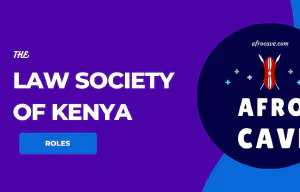Role and Functions of the Law Society of Kenya (LSK)
- Author Gĩthĩnji
- Updated on:

The Functions of the Law Society of Kenya are established by the Law Society of Kenya Act. The Law Society of Kenya (LSK) is a professional statutory body with membership from all advocates in the country.
The Law Society in its present form was established in 1948 by section 3 of the Law Society Kenya Ordinance 1949. The Act was later repealed on 30th October 1992. This was later replaced by the current Law Society of Kenya (LSK) Act of 2014.
The current law reorganized the LSK structure of the Secretariat to promote greater commitment to excellence as well as client care in the practice.
The Society shall be a body corporate with perpetual succession and a common seal and shall, in its corporate name be capable of-
- suing and be sued;
- taking, purchasing or otherwise acquiring, holding, developing or disposing of movable and immovable property;
- borrowing or raising money;
- investing and dealing with monies of the Society not immediately required in such manner as may from time to time be determined by the Society; and
- doing or performing all such other things or acts, which may lawfully, be done by a body corporate.
Table of ContentsShow/Hide
functions of the Law Society of Kenya (LSK)
The objectives and functions of the Law Society of Kenya (LSK) are to:
- assist the Government and the courts in matters relating to legislation, the administration of justice and practice of law in Kenya;
- uphold the Constitution of Kenya and advance the rule of law and the administration of justice;
- ensure that all persons who practice law in Kenya or provide legal services in Kenya meet the standards competence and professional conduct that are appropriate for legal services they provide;
- project and assist the members of the public in Kenya in matters relating to or ancillary or incidental to the laws;
- set, maintain and continuously improve the standards of learning, professional competence and professional conduct for the provision of legal services in Kenya;
- determine, maintain and enhance the standards of professional practice and ethical conduct and learning for the legal profession in Kenya;
- facilitate the acquisition of legal knowledge by members of the Society and ancillary service provider, including paralegal through the promotion of high standards of legal education and training;
- represent, protect and assist members of the legal profession in Kenya in matters relating to the conditions of practice and welfare;
- formulate policies that promote the restructuring of the legal profession in Kenya to embrace the spirit, principles, values and objects of the Constitution of Kenya;
- facilitate the realization of a transformed legal profession that is cohesive accountable, effective & independent;
- establish mechanisms necessary for the provision of equal opportunities for all legal practitioners in Kenya;
- protect and promote the interest of consumers of legal service and the public interest generally by providing fair, effective, efficient and transparent procedures for the resolution of complaints against legal practitioners;
- develop and facilitate adequate training programmes for legal practitioners; and
- do all such other things as are incidental or to the foregoing functions.
Powers and Principles of LSK
LSK shall have the powers to do all things necessary for the effective achievement of its objects and the performance of its functions.
In carrying out its functions and in the exercise of its powers under the LSK Act, the Society shall have regard to the following principles-
- the maintenance and advancement of constitutionalism, justice and the rule of law;
- the facilitation of access to justice;
- the protection of public interest;
- the maintenance of integrity and professionalism; and
- the promotion of cross border legal practice, inclusivity and equity
Membership of Law Society of Kenya (LSK)
Who can be a member of the Law Society of Kenya?
- Any advocate who is a member of the society by virtue of section 28 of the Advocates Act.
- Any person admitted to membership of the society under section 6 of the Law Society of Kenya Act (special membership).
- Any person elected as an honorary member of the society under section 7 of the Law Society of Kenya Act.
- Any person who may have at any time previously been a member of the society and who complies with the regulations of the society for the time being in force.
- Any of the following persons who apply for membership of the society in the prescribed manner may be admitted as a member of the society by the council:
- Any person mentioned in section 9 of the Advocates Act.
- Any other legally qualified person for the time being resident in Kenya
Notwithstanding the above, a member of the Society (except an honorary member) whose name has been, as a result of disciplinary proceedings struck off the Roll of Advocates shall not be a member of the Society during the period of expulsion.
A person who has been expelled from membership of the Society shall not be re-admitted as a member of the Society without the authority of a special resolution
Subject to the provision of Sections 27 and 28 of the Advocates Act, every member of the society shall pay the society such annual subscription as may be prescribed from time to time.
For more about the functions of the Law Society of Kenya and further provisions including membership and management, see the Law Society of Kenya Act.
- «Previous What is a County Annual Development Plan (ADP) in Kenya?
- Next» Role and Duties of a Village Administrator in Kenya


